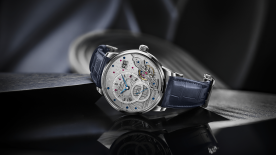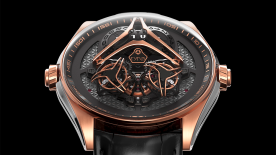GMT XXL - Summer 2009
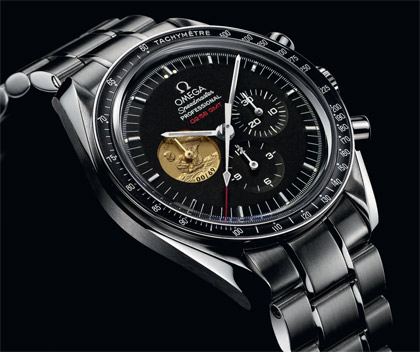 THE FIRST WATCH WORN ON THE MOON
THE FIRST WATCH WORN ON THE MOON
The first manned lunar landing on the 20th of July, 1969 was the greatest, most dramatic scientific achievement in human history. Neil Armstrong stepped onto the moon's surface at 02:56 GMT on the 21st of July. Nineteen minutes later he was joined by Buzz Aldrin, who was wearing his OMEGA Speedmaster and a legend was born. An interesting footnote: the electronic timing system on the Lunar Module was not functioning correctly so Armstrong had left his watch aboard as a reliable backup. The adventure is celebrated through two OMEGASpeedmaster Professional Moonwatch Apollo 11 “40th Anniversary” Limited Edition watches: one in stainless steel and (7,969 pieces); the other in platinum and 18K yellow gold (69 pieces).
The distinctive timepieces are powered by OMEGA's caliber 1861, which shares its lineage with the caliber 321 used in the original Speedmaster Professional Moonwatch. The stainless steel casebody is delivered with a stainless steel bracelet which has been upgraded to include OMEGA's patented screw and pin system. The black dial also recalls that of the Moon Watch but has some key differences. The small seconds counter (sub-dial) is a medallion which features an adaptation of Apollo 11's famous mission patch: an eagle descends to the lunar surface with an olive branch representing peace in its claws. In the distance, far above the horizon, the earth is visible. The patch, interestingly, was designed by Michael Collins who remained in the Apollo 11 capsule as Command Module Pilot while his colleagues Armstrong and Aldrin were in the Lunar Module and on the moon.
ONE SMALL STEP
Below the words “OMEGA Speedmaster PROFESSIONAL” on the dial, the legend 02:56 GMT – the exact time that Neil Armstrong made his “one small step” onto the moon – is displayed in red. The 40th Anniversary Limited Edition's dial is protected by Hesalite, the same robust, shatterproof acrylic crystal found on the original Moon Watch. Hesalite is ideally suited for use in space – there is no chance that it can break apart and send potentially dangerous fragments into the low-gravity environment.
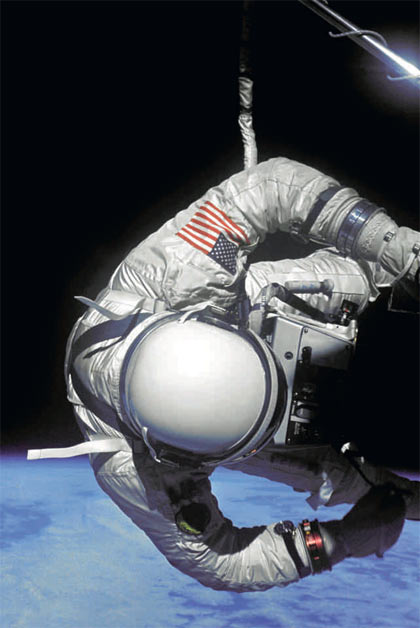
The Apollo 11 “Eagle” mission patch is stamped on the caseback along with the words, “The first watch worn on the moon”, the limited edition number (0000/7969), and “July 21, 1969”, the date Armstrong and Aldrin first stepped onto the moon's surface at 02:56, the time which is printed on the dial. The “40th Anniversary” Limited Edition is delivered in a black presentation box which also includes a 42 mm sterling silver medal (the same diameter as the watch) featuring an engraving of the mission patch. Also in the presentation box is a certificate of authenticity and an envelope containing a black polishing cloth printed with information commemorating the historic space flight.
The story of how the OMEGA Speedmaster became the Moonwatch – the only wristwatch approved by NASA for all manned space flights – all began in the early 1960s when two NASA officials anonymously visited several Houston jewelry stores, including Corrigan's, which at the time was the city's best-known watch and jewelry retailer.
The solo-flight Mercury space programme was almost completed (in fact, Wally Schirra had worn his own Speedmaster on his Mercury flight on the 3rd of October, 1962) and NASA was preparing for the Gemini (twoman) and Apollo (three-man) missions. There were plans for the astronauts on these missions to move about in space outside the ship. One of their key pieces of equipment would be a wristwatch which could withstand the difficult conditions of space. Every time an astronaut suspended in the vacuum of space turned his wrist, the watch would suddenly come out of the shade and be exposed to the unfiltered rays of the sun and temperature increases of more than 100°C. On the moon, President Kennedy's and NASA's declared objective, things would be even tougher. NASA ordered two Speedmasters and two each of five other chronographs for “testing and evaluation purposes” on September 29, 1964 The men from NASA bought a series of chronographs of different brands, charged with the task of finding the best watch available for their astronauts to wear in space.
On March 1, 1965, the test results were complete. Three brands' chronographs had still been in the running. Of those, one brand's entry had stumbled on two separate occasions in the relative humidity test. In the course of the heat-resistance test it finally came to rest for good. The large seconds hand warped and was binding against the other hands.The crystal of the second brand's chronograph had warped and come away from the case during the heat test. The same unfortunate occurrence took place with a second model of the same make during the decompression test.
Only the Omega Speedmaster passed. At the time, NASA's testers wrote, “Operational and environmental tests of the three selected chronographs have been completed; and, as a result of the test, OMEGA chronographs have been calibrated and issued to three members of the GT-3 (Gemini Titan III) crews.” What sounds like a reserved, sober announcement was, in fact, the official decree that from that time forward, the Omega Speedmaster would be the only watch approved for all manned space flights and would be become an inextricable part of the OMEGA legacy. As significant was a NASA communiqué dated March 1st, 1965 which said, “… the astronauts show a unanimous preference for the OMEGA chronograph over the other two brands because of better accuracy, reliability, readability and ease of operation.”
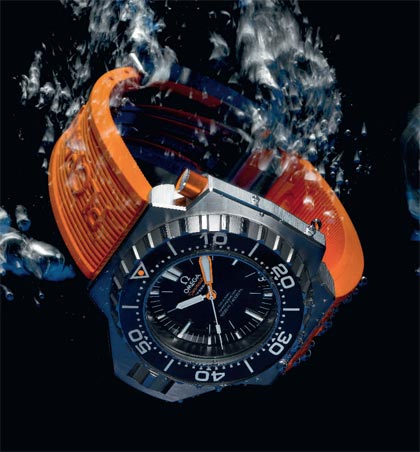
ITS CASE IS QUITE SIMPLY UNMISTAKABLE
Omega's love story with the sea has been going on for years, as the world's great sailors and divers will readily testify. As early as 1970, Omega created a watch capable of withstanding the extreme pressures endured by divers working at great depths. This timepiece, the Seamaster 600m, also called “Ploprof” (an abbreviation of the French term plongeurs professionnels, meaning professional divers), is one of the sturdiest, most robust watches best suited to the underwater world ever produced. Equipped with the Omega Co-Axial Caliber 8500, the new Ploprof is COSC-certified and water-resistant to 1200 meters, ingeniously combining the legendary characteristics of its forerunner with the Omega Co-Axial technology.
The case of the Ploprof is simply unmistakable, with its screw-locked protected crown located at 9 o'clock – a unique position that frees wrist movements and avoids any accidental shifting during a dive. Another feature of the Ploprof is the bezel-release security pusher with an orange anodized aluminum ring at 2 o'clock: one press on this pusher enables the user to turn the bezel in either direction and then to lock it firmly into the chosen position. The Ploprof is also equipped with an automatic helium valve on the side of the case at 4 o'clock. This device enabling helium atoms to escape during the decompression phase is particularly useful for professional divers operating in diving chambers. The Ploprof 1200m is available with either a brushed mesh “Sharkproof” strap or a black or orange rubber strap, featuring a double-extension system and equipped with a new safety clasp enabling precise adjustment thanks to 18 different positions.



